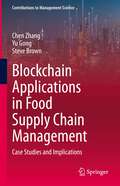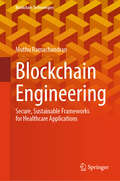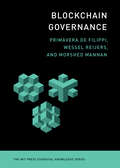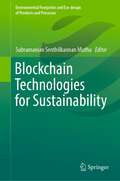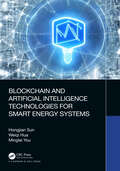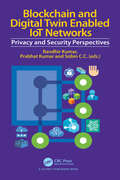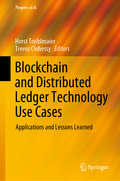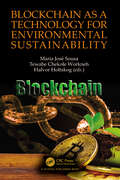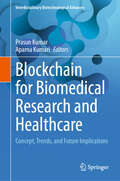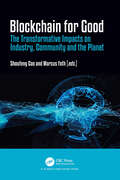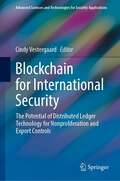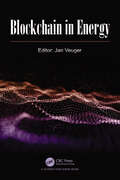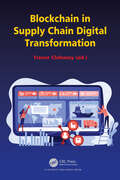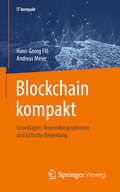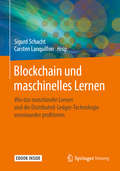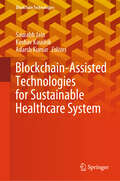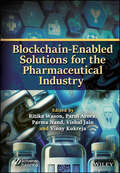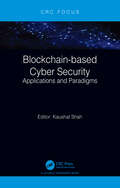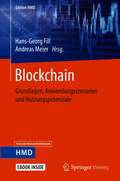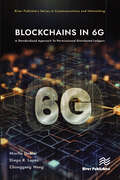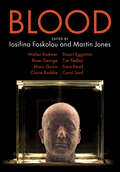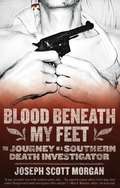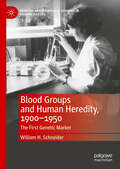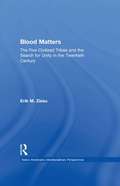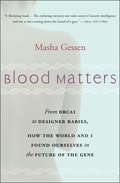- Table View
- List View
Blockchain Applications in Food Supply Chain Management: Case Studies and Implications (Contributions to Management Science)
by Steve Brown Chen Zhang Yu GongThis book contributes to blockchain applications in food supply chain management from both theoretical and practical perspectives. By using the case study research method, it empirically investigates why and how food companies implement blockchain technology. Moreover, it proposes a conceptual framework based on the case findings and extant literature. The book provides empirical evidence to verify academic findings such as critical success factors and barriers. Furthermore, it identifies the implementation process to answer the ‘how’ question. Uniquely, it applies the innovation process model and the practice-based view (PBV) to studies on food supply chains and blockchain. Thus, building on the original model and theory, it enriches the theory on blockchain implementation, making it a valuable asset for all researchers and practitioners interested in blockchain adoption and food supply chain management.
Blockchain Engineering: Secure, Sustainable Frameworks for Healthcare Applications (Blockchain Technologies)
by Muthu RamachandranThis book provides a comprehensive guide to the principles and engineering approaches necessary for developing secure and sustainable blockchain applications. It introduces fundamental blockchain concepts and explores the integration of AI and blockchain. Targeted at students, IT professionals, managers, and healthcare practitioners, this book seeks to empower readers to effectively leverage blockchain technology.
Blockchain Governance (The MIT Press Essential Knowledge series)
by Primavera De Filippi Wessel Reijers Morshed MannanAn engaging and comprehensive exploration of how fundamental ideas in political and legal thought shape the governance of blockchain communities, and are, in turn, shaped by blockchain technology.How can digital cash truly be “trustless”? What does it mean that blockchain offers a new paradigm of the “rule of code”? How are decisions made when a blockchain system faces an emergency, and who gets to make those decisions? In Blockchain Governance, Primavera De Filippi, Wessel Reijers, and Morshed Mannan offer answers to these questions and more, in an accessible, critical overview of legal and political issues related to blockchain technology, now the foundation of a multi-billion-dollar industry. Moving beyond the hype, they show how blockchain offers fertile ground for experimentation with radically new ways to govern people and institutions. Blockchain-based systems, like Bitcoin, Ethereum, Tezos, and countless others, offer new ways of organizing digital cash, “smart” contracts to execute transactions, non-fungible tokens (NFTs) to collect art, and decentralized autonomous organizations (DAOs) to coordinate humans and machines. What these applications have in common is that they govern the behavior of people and artificial agents through distributed systems. Drawing from their extensive experience in researching blockchain technologies and communities, the authors discuss the origins of Bitcoin in cypher-anarchism and extropianism, spectacular events like the million-dollar theft of the DAO Attack, and the hostile takeover of the Steem platform. While engaging with political and legal thinkers such as Hobbes, Kelsen, and the Ostroms, these narratives explore how blockchain governance problematizes fundamental concepts such as rule of law, sovereignty, legality, legitimacy, and polycentric governance.
Blockchain Technologies for Sustainability (Environmental Footprints and Eco-design of Products and Processes)
by Subramanian Senthilkannan MuthuThis book highlights the applications of blockchain technologies to foster sustainable development in different fields. The concept of Sustainability has grown widespread in today’s context and there are many requirements to achieve Sustainability in any industrial sector including mapping, tracing the supply chain to ensure sustainable supply chain management. Reliable and transparent, efficient data is one of the key requirements for Sustainability in today’s advanced industrial context. Achievement of Sustainability objectives in this advanced era demands various technological advancements such as Blockchain technologies. The core competencies of blockchain technology namely transparency, data auditability, privacy, value transfer, and process efficiency and automation are very much essential for achieving the multifold objectives under sustainability.
Blockchain and Artificial Intelligence Technologies for Smart Energy Systems
by Hongjian Sun Weiqi Hua Minglei YouPresent energy systems are undergoing a radical transformation, driven by the urgent need to address the climate change crisis. At the same time, we are witnessing the sharp growth of energy data and a revolution of advanced technologies, with artificial intelligence (AI) and Blockchain emerging as two of the most transformative technologies of our time. The convergence of these two technologies has the potential to create a paradigm shift in the energy sector, enabling the development of smart energy systems that are more resilient, efficient, and sustainable. This book situates itself at the forefront of this paradigm shift, providing a timely and comprehensive guide to AI and Blockchain technologies in the energy system. Moving from an introduction to the basic concepts of smart energy systems, this book proceeds to examine the key challenges facing the energy system, and how AI and Blockchain can be used to address these challenges. Research examples are presented to showcase the role and impact of these new technologies, while the latest developed testbeds are summarised and explained to help researchers accelerate their development of these technologies. This book is an indispensable guide to the current changes in the energy system, being of particular use to industry professionals, from researchers to management, looking to stay ahead of technological developments.
Blockchain and Digital Twin Enabled IoT Networks: Privacy and Security Perspectives
by Prabhat Kumar Randhir Kumar C. C. SobinThis book reviews research works in recent trends in blockchain, AI, and Digital Twin based IoT data analytics approaches for providing the privacy and security solutions for Fog-enabled IoT networks. Due to the large number of deployments of IoT devices, an IoT is the main source of data and a very high volume of sensing data is generated by IoT systems such as smart cities and smart grid applications. To provide a fast and efficient data analytics solution for Fog-enabled IoT systems is a fundamental research issue. For the deployment of the Fog-enabled-IoT system in different applications such as healthcare systems, smart cities and smart grid systems, security, and privacy of big IoT data and IoT networks are key issues. The current centralized IoT architecture is heavily restricted with various challenges such as single points of failure, data privacy, security, robustness, etc. This book emphasizes and facilitates a greater understanding of various security and privacy approaches using the advances in Digital Twin and Blockchain for data analysis using machine/deep learning, federated learning, edge computing and the countermeasures to overcome these vulnerabilities. This book emphasizes and facilitates a greater understanding of various security and privacy approaches using the advances in Digital Twin and Blockchain for data analysis using machine/deep learning, federated learning, edge computing and the countermeasures to overcome these vulnerabilities.
Blockchain and Distributed Ledger Technology Use Cases: Applications and Lessons Learned (Progress in IS)
by Horst Treiblmaier Trevor ClohessyBlockchain and other trustless systems have gone from being relatively obscure technologies, which were only known to a small community of computer scientists and cryptologists, to mainstream phenomena that are now considered powerful game changers for many industries. This book explores and assesses real-world use cases and case studies on blockchain and related technologies. The studies describe the respective applications and address how these technologies have been deployed, the rationale behind their application, and finally, their outcomes. The book shares a wealth of experiences and lessons learned regarding financial markets, energy, SCM, healthcare, law and compliance. Given its scope, it is chiefly intended for academics and practitioners who want to learn more about blockchain applications.
Blockchain as a Technology for Environmental Sustainability
by Halvor Holtskog Maria José Tewabe Chekole WorknehAt a time of growing environmental concerns and an urgent need for sustainable solutions, the intersection of blockchain technology and environmental sustainability is emerging as a powerful force for positive change. The environmental challenges of our time, including climate change, resource scarcity and the destruction of ecosystems, require innovative solutions that transcend geographical and political boundaries. Blockchain technology, with its decentralized and transparent nature, can not only track and verify environmental efforts, but also incentivize them.
Blockchain for Biomedical Research and Healthcare: Concept, Trends, and Future Implications (Interdisciplinary Biotechnological Advances)
by Prasun Kumar Aparna KumariBlockchain is a new type of technology that combines and secures information exchange between different stakeholders such as medical practitioners, patients, healthcare providers, and other applicable parties. Among them, Blockchain Technology is one of the most important areas in the bioinformatics application of biomedical research and healthcare systems utilizing unique requirements and integration features. All the chapters are written by experts and researchers working in various areas of the biomedical and healthcare domain and they also dive into one of the most overlooked methodological, practical, and moral questions to secure and handle the enormous amount of data being generated from IoT-enabled biomedical and healthcare systems. In the beginning, this book presents an overview and then discusses open issues, challenges, and applicability aspect of Blockchain technology in healthcare. Then, this book presents a variety of perspectives on the most pressing questions in the field, for example: how IoT can connect billions of biomedical and healthcare information; how the blockchain-based secure access control mechanisms in biomedical and healthcare work; how to address the Quality-of-Service (QoS) and real-time accessibility requirements for healthcare applications; and how to ensure communication with efficiency. Also, it discusses Blockchain for IoT-enabled healthcare systems and presents a comparative analysis with respect to various performance evaluation metrics too.
Blockchain for Good: The Transformative Impacts on Industry, Community and the Planet
by Marcus Foth Shoufeng CaoBlockchain, a technology originally developed for cryptocurrency, has evolved into a versatile tool capable of driving significant change across industries and communities. Its decentralised, secure, and transparent nature has proven valuable in applications that transcend finance, impacting supply chains, digital governance, and sustainability practices. By enabling greater trust and accountability, blockchain technology can foster ethical solutions to global challenges, promoting transparency, inclusivity, and efficiency within sectors like agriculture, healthcare, and environmental management. This book explores blockchain’s role as a catalyst for meaningful change and its potential to contribute positively to our digital future.Structured into three parts—Industry, Community, and Planet—this book examines blockchain’s role in advancing (i) sustainable business practices, (ii) supporting fairer social systems, and (iii) addressing environmental goals. Each section presents diverse case studies and theoretical insights, showing how blockchain can be applied responsibly and ethically. From enhancing transparency in fashion supply chains to supporting smallholder farmers, and from reshaping public governance to promoting the circular economy, the book offers a thorough understanding of blockchain’s transformative capabilities. It highlights interdisciplinary research and applied projects across the globe that exemplify blockchain’s capacity to serve societal and environmental purposes.Ideal for researchers, policymakers, and industry professionals, this book provides practical insights into blockchain’s potential beyond the hype. Whether you are in technology, social sciences, or environmental studies, Blockchain for Good serves as an essential resource for anyone interested in exploring how blockchain can contribute to a more equitable and sustainable world.
Blockchain for International Security: The Potential of Distributed Ledger Technology for Nonproliferation and Export Controls (Advanced Sciences and Technologies for Security Applications)
by Cindy VestergaardThis book intersects the distributed ledger technology (DLT) community with the international security community. Given the increasing application of blockchain technology in the fields of business and international development, there is a growing body of study on other use cases. For instance, can blockchain have a significant role in preserving and improving international security? This book explores this question in the context of preventing the proliferation of some of the most dangerous materials in the world—items that if not secured can lend to the development of weapons of mass destruction. It considers how blockchain can increase efficiencies in the global trade of nuclear and chemical materials and technology, thereby increasing assurances related to compliance with international nonproliferation and disarmament treaties.
Blockchain in Energy
by Jan VeugerThe global energy crisis is accelerating, and within Europe, the European Union (EU) is actively working to address this challenge through policy frameworks and political management. However, the energy market remains fiercely competitive, prompting us to explore alternative energy sources and rethink how we generate, distribute, and utilize power. This, in turn, raises questions about the allocation of power, energy availability, and usage in various contexts.Furthermore, the digital realm is undergoing rapid transformation across multiple sectors. Drawing on my expertise in blockchain technology, I recognize numerous opportunities to enhance the transparency and reliability of data related to energy issues. By leveraging blockchain, we can ensure that the information available is trustworthy and insightful for every user.The aim of this book is to share my knowledge in the realm of energy and blockchain. It addresses the urgency of addressing global energy challenges and acknowledges the pivotal role of the EU in this endeavor. It also highlights the intensity of competition in the energy market and the need for innovative approaches. The book also demonstrates how blockchain can contribute to solving these issues, empowering individuals and organizations with reliable information and insights in the field of energy and blockchain technology.
Blockchain in Supply Chain Digital Transformation
by Trevor ClohessyBlockchain and distributed ledger technology (DLT) have been identified as emerging technologies that can enhance global supply chain management processes. Given the embryonic nature of the technology, use cases pertaining to how it can be adopted and deployed in supply chain contexts are scarce. This book shares blockchain supply chain use cases across a range of industries including smart cities, food imports, product traceability, decentralised finance, procurement, energy management, consensus mechanism security, and industry 4.0. Given its scope, it is primarily intended for academics, students, researchers, and practitioners who want to learn more about how blockchain can digitally transform global supply chains.
Blockchain kompakt: Grundlagen, Anwendungsoptionen und kritische Bewertung (IT kompakt)
by Andreas Meier Hans-Georg FillLernen Sie in diesem Fachbuch mehr über die Grundlagen von BlockchainSie interessieren sich für Kryptowährungen durch Blockchain-Technologie? Aber irgendwie erscheint Ihnen die Thematik wie ein Buch mit sieben Siegeln? Dieses Fachbuch von Hans-Georg Fill und Andreas Meier liefert Ihnen einen Überblick rund um Blockchain. Es erläutert detailliert und übersichtlich die Grundlagen zu folgenden Themenfeldern:Datenstrukturen wie Hash-Funktionen und -BäumeDigitale SignaturFunktionenKonsensalgorithmenetc.Blockchains sind jedoch nicht nur ein Teil von Kryptowährungen. Es handelt sich um ein digitales Buchungssystem. Die Technologie von Ethereum ist daher für viele Unternehmen äußerst interessant (Stichwort Smart Contracts, Smart Grid, Smart Cities). Das Fachbuch über Blockchain ist somit genau das Richtige für Sie, wenn Sie Verbesserungen im eigenen Unternehmen, der Verwaltung oder im öffentlichen Leben vornehmen oder alternative Lösungen angehen wollen.Konzepte und Anwendungen der KryptographieIn den sechs Kapiteln des Fachbuches über Blockchain liefern Ihnen die Autoren Antworten auf verschiedene rechtliche Fragen. Sie befassen sich im Rahmen ihrer Ausführungen kritisch mit der Blockchain-Technologie und zeigen Ihnen wichtige Anwendungsoptionen. Sie erhalten einen fundierten Überblick über folgende Themenfelder:Motivation Betrugsprävention Grundlagen zur Blockchain-Technologie Aufbau und Funktion der BlockchainAnwendungsoptionen Rechtliche FragenKritische EinschätzungDieses Fachbuch über Blockchain richtet sich an Führungsverantwortliche, Projektleiter und Interessierte, die sich einen Überblick über das Potenzial der Blockchain-Technologie verschaffen möchten.
Blockchain und maschinelles Lernen: Wie das maschinelle Lernen und die Distributed-Ledger-Technologie voneinander profitieren
by Sigurd Schacht Carsten LanquillonDurch Bitcoin wurde die Blockchain als zugrundeliegende Technologie bekannt. Sie zählt zu den Distributed-Ledger-Technologien, die zukünftig viele Bereiche des wirtschaftlichen Handels beeinflussen werden. So bergen dezentrale autonome Anwendungen enormes Potenzial, nicht nur Prozesse, sondern auch Vertragsabstimmungen zu automatisieren. Beispielsweise kann ein automatisiertes wirtschaftliches Handeln zwischen Maschinen ermöglicht werden. Um einen derart hohen Automatisierungsgrad zu erreichen, müssen datenbasierte Entscheidungen autonom – ohne menschliches Zutun – getroffen werden. Maschinelle Lernverfahren können dabei eine zentrale Komponente bei der Entscheidungsfindung einnehmen. Das Buch stellt erstmalig die komplementären Themengebiete Distributed-Ledger-Technologie und maschinelles Lernen gegenüber und zeigt auf, welches Potenzial freigesetzt werden kann, wenn beide Technologien zielführend miteinander verbunden werden. Das Buch ist eine unverzichtbare Lektüre für diejenigen, die sich tiefgreifendes Wissen in der Kombination beider Themengebiete aufbauen wollen, indem einerseits die theoretischen Grundlagen und andererseits auch mögliche Anwendungsszenarien dargestellt werden.
Blockchain-Assisted Technologies for Sustainable Healthcare System (Blockchain Technologies)
by Saurabh Jain Adarsh Kumar Keshav KaushikThis book highlights how blockchain and other emerging technologies can improve services, processes, and applications for a sustainable healthcare system. It covers theoretical and practical elements of blockchain technology and analyzes the possibilities, problems, applications, and research in the field of blockchain-based sustainable healthcare applications. It provides the necessary information for readers, blockchain practitioners, researchers, database professionals, etc. Furthermore, the book identifies current literature gaps on the application of blockchain technology in the sustainable healthcare industry. Sustainable healthcare is a data-intensive industry that generates, receives, and transmits massive amounts of data daily. Existing data-sharing protocols in sustainable healthcare systems routinely expose system vulnerabilities in ensuring the confidentiality and security of healthcare data. Most functions in sustainable healthcare systems involve the sharing or use of sensitive and personal data. A serious problem is developing technologies that preserve the usefulness of health data while protecting patient privacy and discretion in how their data is used. As a result, the research community studies safe, privacy-preserving, and sustainable health systems using emerging technologies such as blockchain. Blockchain has emerged as an essential technology in the current digital transformation of many industries, including supply chain, education, government, healthcare, and many more sustainable applications. Blockchain applications for healthcare data management can potentially develop new services for physicians, patients, and health institutions in patient records administration, payment management, claims, and data integrity. This allows patients and healthcare organizations to limit unauthorized access to sensitive information and to maintain irreversible audit trails of patient data access and change. Blockchain and other emerging technologies can potentially be used for sustainable health supply chain activities. By making the supply chain transparent and immutable, it can monitor and protect healthcare data at various levels while maintaining 100% integrity of healthcare data.
Blockchain-Enabled Solutions for the Pharmaceutical Industry
by Ritika Wason Vishal Jain Parul Arora Parma Nand Vinay KukrejaThe 25 chapters in this volume serve as a comprehensive guide to understanding and implementing blockchain-enabled solutions in the pharmaceutical industry. The pharmaceutical industry is undergoing a holistic transformation, where innovation is key to addressing complex challenges and enabling user-centric, customized services. This book explores the potential applications of blockchain technology in revolutionizing pharmaceutical processes. By integrating blockchain fundamentals, the pharmaceutical industry can enhance transparency, security, and efficiency in areas such as supply chain management, patient safety, and more. Blockchain can also improve regulatory compliance, streamline clinical trials, and protect data integrity. Furthermore, it enables secure transactions, reduces the prevalence of counterfeit drugs, and strengthens patient privacy and data management. Some of the subjects readers will find the volume covers include: How blockchain technology can revolutionize the healthcare sector by enabling a secure, decentralized, and tamper-proof system for handling patient data, and facilitating seamless information sharing across various healthcare providers • how blockchain transforms the pharmaceutical industry by enhancing drug traceability, ensuring product authenticity, and reducing counterfeit drugs • a comprehensive blockchain-based framework to improve the pharmaceutical supply chain from manufacturers to end consumers • how the Pharma-RBT solution utilizes blockchain technology to protect personally identifiable information (PII) during drug trials • the use of blockchain-based smart contracts to automate and streamline payment processes reducing transaction times and minimizing human errors • surveys how blockchain can ensure the validity of pharmaceutical products by providing an immutable and transparent ledger that tracks each phase of a drug’s lifecycle, from production to the end consumer • how blockchain can enhance the security of smart medicine vending machines • how blockchain can improve the kidney transplantation process by enhancing the security, traceability, and efficiency of donor-recipient matching, organ transportation, and post-operative care • how blockchain can contribute to the development of the metaverse by enabling decentralized ownership of virtual assets • how blockchain can improve clinical trials by enhancing transparency, efficiency, and ethical conduct in drug development • how blockchain technology can revolutionize the drug recall process • how integrating hybrid technologies with blockchain can enhance smart healthcare systems • how the metaverse can transform healthcare by offering immersive virtual environments for medical training, patient education, and remote consultations. Audience The book will appeal to researchers, scientists, and professionals in the biomedical and pharmaceutical industries, as well as computer scientists and experts in blockchain technology, cybersecurity, and logistics.
Blockchain-based Cyber Security: Applications and Paradigms
by Kaushal ShahThe book focuses on a paradigm of blockchain technology that addresses cyber security. The challenges related to cyber security and the solutions based on Software Defined Networks are discussed. The book presents solutions to deal with cyber security attacks by considering real-time applications based on IoT, Wireless Sensor Networks, Cyber-Physical Systems, and Smart Grids. The book is useful for academicians and research scholars worldwide working in cyber security. It is also useful for industry experts working in cyber security.
Blockchain: Grundlagen, Anwendungsszenarien und Nutzungspotenziale (Edition HMD)
by Andreas Meier Hans-Georg FillSowohl in der Praxis als auch der wissenschaftlichen Forschung ist das Thema "Blockchain" aktuell von großem Interesse. Noch scheint sich die Technologie am Anfang ihrer Entwicklung zu befinden: Plattformen wie Bitcoin, Ethereum, Hyperledger Fabric, Libra, TradeLens oder andere weisen bereits einen beeindruckenden Reifegrad in ihrer technischen Entwicklung auf. Dennoch befinden sich erst wenige von ihnen bzw. darauf aufbauende Applikationen im produktiven Einsatz bei Unternehmen. Hier können nicht nur Forschende optimal dazu beitragen, neue Ideen zu entwickeln, noch nicht betrachtete Anwendungsfälle und -domänen zu untersuchen und erste Prototypen für den konkreten Einsatz zu entwickeln. Die Beiträge der vorliegenden Edition HMD bieten dazu einen umfassenden Überblick und zeigen die große Bandbreite an möglichen Anwendungsfeldern für Blockchains. Das Herausgeberwerk vermittelt somit die Grundlagen zur Blockchain-Technologie, widmet sich den Smart Contracts und beschreibt wichtige Anwendungsszenarien, erste Fallbeispiele und rechtliche Aspekte. Wie typisch für die Fachbuchreihe Edition HMD greifen die Beitragsautoren das Thema aus Sicht von Forschung und Praxis gleichermaßen auf. Ein Glossar mit den wichtigsten Begriffen rundet das Buch ab.
Blockchains in 6G: A Standardized Approach To Permissioned Distributed Ledgers (River Publishers Series in Communications and Networking)
by Chonggang Wang Mischa Dohler Diego R. LopezBased on work done within ETSI, this comprehensive guide dives deep into the heart of blockchains and their imminent intersection with 6G. Whether you're a tech enthusiast or an industry expert, this book promises to enlighten, engage, and inspire, drawing you into the exciting intersection of 6G and blockchains.Part I - Blockchain Enablers: Embark on a foundational journey through blockchains, unraveling their basic principles and complex mechanics. From understanding the rudiments of blockchains to exploring the nuances of smart contracts, this section elucidates the pivotal aspects that make blockchains tick. Learn about the necessity for scalability, interoperability, and the crucial role of permissioned distributed ledgers.Part II - Blockchain Ecosystem: Delve into the underpinnings that form the blockchain ecosystem. This segment demystifies the governance and technical standards that guide blockchains and touches upon the alliances formed in its name. As an essential addition, it delves into the regulatory landscape and the critical R&D projects pushing blockchain boundaries.Part III - Blockchain Standards: Setting a benchmark for quality and reliability, this part deciphers the ETSI standards work governing blockchains. Understand the governance of permissioned distributed ledger (PDL) applications, explore reference architectures, and comprehend the role of smart contracts. Data management in a distributed setup and the intricacies of offline operations are neatly detailed, followed by a deep dive into the challenges and solutions for ledger interoperability.Part IV - Blockchains in 6G: The last part of the book bridges the vast world of blockchains with the frontier of 6G telecommunication systems. Commencing with an introduction to the predecessors of 6G, it then charts the course for blockchains' role in 6G data sharing and the radio access network, as well as the emerging topic of the metaverse.
Blood (Darwin College Lectures)
by Martin Jones Iosifina FoskolouBlood is life, its complex composition is finely attuned to our vital needs and functions. Blood can also signify death, while 'bloody' is a curse. Arising from the 2021 Darwin College Lectures, this volume invites leading thinkers on the subject to explore the many meanings of blood across a diverse range of disciplines. Through the eyes of artist Marc Quinn, the paradoxical nature of blood plays with the notion of self. Through those of geneticist Walter Bodmer, it becomes a scientific reality: bloodlines and diaspora capture our notions of community. The transfer of blood between bodies, as Rose George relates, can save lives, or as we learn from Claire Roddie can cure cancer. Tim Pedley and Stuart Egginton explore the extraordinary complexity of blood as a critical biological fluid. Sarah Read examines the intimate connection between blood and womanhood, as Carol Senf does in her consideration of Bram Stoker's novel Dracula.
Blood Beneath My Feet
by Joseph Scott MorganHave you ever been locked in a cooler with piles of decomposing humans for so long that you had to shave all the hair off your body in order to get rid of the smell? Joseph Scott Morgan did. Have you ever lit a Marlboro from the ignited gas of a bloated dead man's belly? Joseph Scott Morgan has. Have you ever wept over a dead dog while not giving a shit about the dead owner laying next him? Morgan did. Were you named after a murder victim? Joseph Scott Morgan was. This isn't Hollywood fantasy--it's the true story of a boy born into the deprivations of a white trash trailer park who as an adult gets further involved in the desperate backdoor sagas of the "new South." No hot blondes here, just maggots, grief, and the truth about forensics and death investigation. Joseph Scott Morgan became a death investigator with the Jefferson Parish Coroner's Office in suburban New Orleans in 1987, the youngest medicolegal death investigator in the country. During the day, Morgan worked in the morgue, and at night investigated for the coroner. In 1992 Morgan became senior investigator with the Fulton County Medical Examiner's Office in Atlanta. Morgan is now a college professor at North Georgia College and State University, where he teaches a death investigation course based on the national standards which he helped develop. He and his family reside in the Blue Ridge Mountains of north Georgia.
Blood Groups and Human Heredity, 1900-1950: The First Genetic Marker (Medicine and Biomedical Sciences in Modern History)
by William H. SchneiderThis monograph presents a detailed analysis of the beginning and rapid establishment of blood group research in the first half of the twentieth century. The main theme of this book is how blood groups were used as a scientific explanation of differences in race, health, and human behaviour. The discovery of the inheritance of blood groups, and their uneven distribution among various human populations quickly developed into a new field of scientific study in various countries around the world. Almost as quickly, the discoveries were studied as genetic markers of race, disease, and behaviours such as crime, insanity, and temperament. The time scope of coverage is the first half of the twentieth century, beginning with Landsteiner’s discovery of blood groups and ending with the period following the Second World War when the research was picked up again and became part of the revolution in human genetics accelerated by the discovery of the double helix. By this time, blood group genetics had undermined the very concept of race and became the foundation of population genetics. The focus on the formative period of blood group research complements the recent resurgence of interest in the subject by providing in- depth background and a base for further research.
Blood Matters: Five Civilized Tribes and the Search of Unity in the 20th Century (Native Americans: Interdisciplinary Perspectives)
by Erik March ZissuThis study explores how the five tribes of Oklahoma - Cherokees, Chickasaws, Choctaws, Creeks, and Seminoles - strove to achieve political unity within their tribes during the first decades of the 20th century by forging a new sense of peoplehood around the idea of blood.
Blood Matters: From BRCA1 to Designer Babies, How the World and I Found Ourselves in the Future of the Gene
by Masha GessenA National Book Award winner&’s personal journey through the ethical dilemmas and unsettling choices raised by the new frontier of DNA testing. Several years after Masha Gessen&’s mother died of breast cancer, she discovered she too had the BRCA1 gene mutation, which predisposes women to high rates of ovarian and breast cancer. Her doctors gave her narrow options: surgical removal of her breasts and ovaries or living with the likelihood of one day developing cancer. As Gessen wrestled with her own health decisions, she sought more information about the implications of genetic testing from a variety of sources—ranging from others faced with her same dilemma to medical researchers, historians, and religious thinkers. With concerns both practical and philosophical, personal and societal, her inquiry led her across the globe, with stops in Israel, Russia, Austria, and the United States. Weaving her own story into her journalistic research, Gessen offers insight into how knowledge that was once unimaginable now shapes our lives. Blood Matters explores not only the decisions we must make in our physical and emotional health, but also the ethical choices we face when choosing spouses or having children. &“Valuable reading to almost anyone facing a huge health decision, not only for the literary commiseration it offers, but also for the inspired example of medical sleuthing on one&’s own behalf that it provides. Gessen keeps an inflammatory topic at room temperature, writing elegantly and without self pity.&” —The New York Times Book Review
